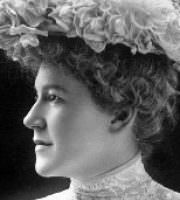by Charles Baudelaire
Les cloîtres anciens sur leurs grandes murailles
Etalaient en tableaux la sainte Vérité,
Dont l'effet réchauffant les pieuses entrailles,
Tempérait la froideur de leur austérité.
En ces temps où du Christ florissaient les semailles,
Plus d'un illustre moine, aujourd'hui peu cité,
Prenant pour atelier le champ des funérailles,
Glorifiait la Mort avec simplicité.
- Mon âme est un tombeau que, mauvais cénobite,
Depuis l'éternité je parcours et j'habite;
Rien n'embellit les murs de ce cloître odieux.
Ô moine fainéant! quand saurai-je donc faire
Du spectacle vivant de ma triste misère
Le travail de mes mains et l'amour de mes yeux?
The Bad Monk
Cloisters in former times portrayed on their high walls
The truths of Holy Writ with fitting pictures
Which gladdened pious hearts and lessened the coldness,
The austere appearance, of those monasteries.
In those days the sowing of Christ's Gospel flourished,
And more than one famed monk, seldom quoted today,
Taking his inspiration from the graveyard,
Glorified Death with naive simplicity.
- My soul is a tomb where, bad cenobite,
I wander and dwell eternally;
Nothing adorns the walls of that loathsome cloister.
O lazy monk! When shall I learn to make
Of the living spectacle of my bleak misery
The labor of my hands and the love of my eyes?
- Translated by William Aggeler
The Evil Monk
The walls of cloisters on their frescoed lath
Displayed, in pictures, sacred truths of old,
Whose sight would warm the entrails of one's faith
To temper their austerity and cold.
In times when every sowing flowered for Christ
Lived famous monks, now out of memory's reach;
The graveyard for their library sufficed,
And Death was glorified in simple speech.
My soul's a grave, where, evil cenobite,
To all eternity I have been banned.
Nothing adorns this cloister fall of spite.
O idle monk! Say, to what end were planned
The living spectacle of my sad plight,
Love of my eye, or labour of my hand?
- Translated by Roy Campbell
Le Mauvais Moine
the wide cold walls of cloisters, long ago
set forth God's Holy Truth for all to see,
and gazing friars there, with hearts aglow,
rejoiced despite their chill austerity.
then, when the seed of Christ would always grow,
illustrious monks, now lost to memory,
would choose the burial-plot for studio
to chant Death's glory, unaffectedly.
my soul's a tomb, which - wretched friar! - I
have paced since Time began, and occupy;
bare-walled and hateful still my cloister stands.
o slothful monk! when shall I learn to find
in the stark drama of this living mind
joy for mine eyes and work to fit my hands?
- Translated by Lewis Piaget Shanks
The Bad Monk
On the great walls of ancient cloisters were nailed
Murals displaying Truth the saint,
Whose effect, reheating the pious entrails
Brought to an austere chill a warming paint.
In the times when Christ was seeded around,
More than one illustrious monk, today unknown
Took for a studio the funeral grounds
And glorified Death as the one way shown.
-My soul is a tomb, an empty confine
Since eternity I scour and I reside;
Nothing hangs on the walls of this hideous sty.
O lazy monk! When will I see
The living spectacle of my misery,
The work of my hands and the love of my eyes?
Translated by William A. Sigler





